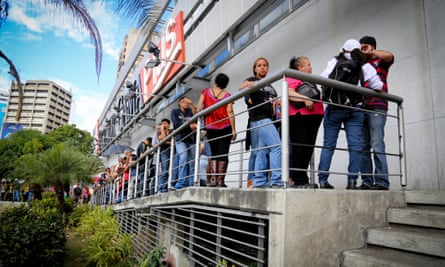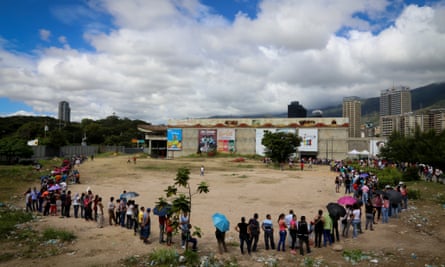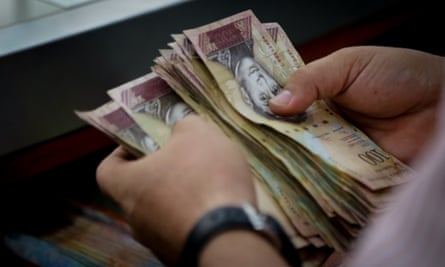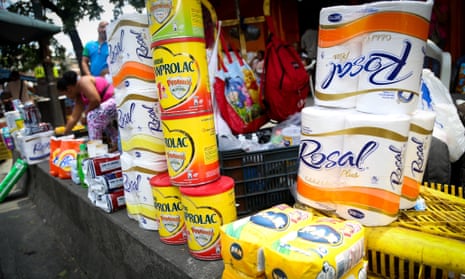In Petare, a giant slum overlooking Caracas from the east, hustlers known as buhoneros sell their goods at a busy intersection. “I’ve got milk, toilet paper, coffee, soap…” said 30-year-old Carmen Rodríguez, pointing to her wares by the side of a road busy with honking motorbikes, cars and buses. “Of course they cost more than the government say they should. We have to queue up to get them or buy them from someone who has done. We’re helping people get the basics.”
Yet, many of the poor simply can’t afford Rodríguez’s basics. In a raw and arguably necessary display of capitalism, she sells them for far more than the government’s legally required “fair prices”. It is ironically because of those government-imposed fair prices that the goods often aren’t available at supermarkets at fair prices as it’s simply not profitable to import them. This is thanks to economic policies dating back more than a decade.
Rodríguez sells each of her products for around 100 bolívares. At the black market currency exchange rate, that’s just 30 pence or so. But at that same exchange rate, the minimum wage in Venezuela is around £15 a month.

“I can’t live like this, earning the minimum wage. It’s not enough at all,” said Araceli Belaez, 40, lining up for groceries at a supermarket in the Caracas slum of Catia.
Johan Elizandre is a fruit-seller in 23 de enero, a slum on the other side of Caracas. It overlooks the presidential palace and its walls are adorned with murals of leftist heroes such as Che Guevara, Karl Marx and former Venezuelan president Hugo Chávez. “A kilo of meat costs me 600 bolívares” said Elizandre, who earns 7,000 bolívares a month, around £20 when measured at the black market exchange rate – far more than the minimum wage. “I have sons, aged five and seven. I’d rather give them the food and not eat so much myself.”
The scenes at Petare’s intersection, 23 de enero’s streets and Catia’s supermarkets are manifestations of an economy in tatters: one in which people buy milk, toilet paper and shampoo at inflated prices because supermarkets, with long queues outside, are near empty; in which engineers and lawyers smuggle pasta and petrol across borders to earn many times more than they would carrying out their profession; and in which surgeons complain that people are dying on the operating table because they cannot import medicines and equipment.

President Nicolás Maduro’s approval ratings are currently in the mid-20s. Annual inflation is at nearly 70% – which doesn’t include goods prices with the hefty premiums charged by the buhoneros like Rodríguez. The currency has fallen some 30% against the US dollar this year on the black market. And the murder rate is one of the world’s worst.
In 2003, Maduro’s predecessor Chávez enacted strict currency controls, pegging the bolívar to the US dollar. The aim was to reduce inflation and curb capital flight though neither has been achieved. Price controls, currency controls and the lack of dollars the government provides mean that importers no longer have the incentive to bring in goods. A thousand bolívares would have bought £30 on the black market when Maduro was elected to power in March 2013; it now buys less than £3. In the meantime, prices have risen rapidly while wages have not kept up.
On the country’s border with Colombia at San Antonio, engineer Jesús Arias, 33, has given up on his profession and smuggles petrol across the border. One of the country’s most costly price controls means that filling an entire tank costs just a couple of cents, converted at black market rates. Over the border, petrol sells for hundreds of times more. “Here petrol is practically a free gift,” Arias said. “A litre of mineral water costs more than a litre of gas.”
The subsidy costs the government around $12bn (£8bn) a year and Maduro is very clear that it needs to end – though that would be politically disastrous. Arias fills his 50-litre tank for just a few pence; a few hundred metres across the bridge in Cúcuta, Colombia, he can sell that for around £15. “Doctors, lawyers, architects, engineers we’re all doing it,” he said. “Here on the border, I can earn in three or four days what I earn as a professional in a month.” Children walk across the bridge with Coca-Cola bottles filled with petrol.
Maduro blames the problems on an “economic war” being waged against his government, with help from Washington. He blames smugglers, hoarders and street vendors for causing the problems rather than being a consequence of them.

Last year, the government tried to ban websites which publish the black market exchange rate, leading one blogger to liken the manoeuvre to banning the sale of thermometers to crack down on cold weather.
Yet, the black market, while imperfect, is offering an escape valve for the economy, a means for the poor by whatever means to obtain goods they would otherwise have to do without. “Repressing the black market rate, smuggling or trading is going to deteriorate the economic picture even further,” said Alberto Ramos, a senior analyst at Goldman Sachs in New York. “It will lead to even high inflation and higher levels of goods’ scarcity. The unofficial foreign exchange market and smuggling are to a large extent economic escape valves.”
For some government supporters, the rhetoric does work, however. “There’s nothing in the supermarkets because of the buhoneros,” said Ana Pérez, 60, walking past Rodríguez and the other vendors in Petare. “The government is doing it’s best but the opposition are getting in the way.”
Yet, Rodríguez, back on her stall, was clear. “The problem is the government. If there are shortages everywhere, what are people going to do. Every day it’s worse for people, but good for us. Someone always earns from all this.”
Join our community of development professionals and humanitarians. Follow@GuardianGDP on Twitter. Use #NOunbanked

Comments (…)
Sign in or create your Guardian account to join the discussion